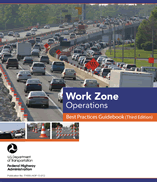Work Zone Best Practices Guidebook

 The Work Zone Operations Best Practices Guidebook (Third Edition) provides an easily accessible compilation of work zone operations practices used and recommended by various States and localities around the country for effectively managing work zones and reducing the impacts of work zones on mobility and safety. The Third Edition includes updates made through ongoing cooperation between FHWA and State agencies to keep pace with the evolving state of the practice.
The Work Zone Operations Best Practices Guidebook (Third Edition) provides an easily accessible compilation of work zone operations practices used and recommended by various States and localities around the country for effectively managing work zones and reducing the impacts of work zones on mobility and safety. The Third Edition includes updates made through ongoing cooperation between FHWA and State agencies to keep pace with the evolving state of the practice.
Best Practices are organized into 11 focus area categories, and cross-referenced by six descriptive parameters that let users find best practices applicable to their own situation. A subject index offers over 50 topics and subtopics for more specific searches.
These best practices are provided as references, not requirements — they are descriptive, not prescriptive. They describe approaches that have been successfully used by transportation agencies, along with contact information to find out more from the agency using the practice. Each organization must determine which of these practices are best suited for its particular situation, considering all the site-specific factors that affect work zone operations, and apply at their own discretion.
The Guidebook is available in three formats:
- Best Practices Guidebook (HTML) - A searchable, online HTML version
- Best Practices Guidebook (PDF) (PDF 1.9MB) - A downloadable electronic copy of the print version.
- A hardcopy version bound in a three-hole binder (293 pages). You may request a hardcopy version of the Guidebook by sending an email with your contact information including mailing address to WorkZoneFeedback@dot.gov. Please remember to specify the "Best Practices Guidelines" in your request.
PDF files can be viewed with the Acrobat® Reader®.
